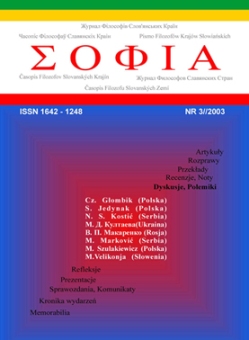


Book Review: Kazimierz Kołodziejczyk, Etyka społeczna Karola Wojtyły, wyd. Adam Marszałek, Toruń 2000, ss. 113
More...
Keywords: Translation from English into Polish - Artur Mordka
While Husserl offered the beginnings of a properly ontological account of dependence, it was his student Roman Ingarden who first recognized the vast applicability of the notion of dependence, and who first distinguished important variations in the relation of dependence. In this paper I discuss Ingarden’s contributions to the theory of dependence, such as admitting cases of dependence for so-being as well as for being and distinguishing temporal variations in the dependence relation. His work provides the basis for a new theory of dependence at once more comprehensive and able to make finger-grained distinctions than prior theories. Such a new theory of dependence is outlined at the close of the paper.
More...
Book Review: W. Seńko, Jak rozumieć filozofię średniowieczną, Kęty 2001, ss. 170
More...

Keywords: Translation from Czech into Polish - Marian Aleksandrowicz
From the tlanslator: „The Ideals of Humanism” (the title of the original Idealy humanitni) first appeared in print in the form of a series of nine articles published in the “Czas” newspaper in March, 1901. The same year saw also its book edition. From that moment on the work became very popular which led to its several reprints later on. The translation was accomplished from the 6th edition (CIN, Praha 1930). As the book comprises mainly the notes taken from the public lectures of professor Masaryk, only slightly corrected for publication purposes, the specifically conversational style with numerous reiterations and digressions has been kept unaltered in the translation. The comments by V. QK. Škrach appended to the 4th 1927 edition of the book as well as the bibliography consisting of a little over 10 entries, containing references mostly to the well-known philosophical works of the 19th century, have been omitted as inessential for the contemporary Polish reader.
More...
Keywords: Translation from Serbo-Croatian into Polish - Henryk Pisarek
More...
Valerian Muraviov (1885–1932) is one of the most significant repre-sentatives of Russian philosophy of cosmism. He has been lately discovered in Russian history of philosophy. In last decade one took the trouble to pub-lish his works using his remained manuscripts. In this text the author presents Muraviev’s: philosophy of creation, philosophical anthropology and selected problems of political philosophy (also his national idea).
More...

Srzednicki argues, that to achieve a positive answer to the Kantian question, how knowledge is possible, in non-circular manner, we have to debar any item that is itself a piece of cognition from being considered the archetypal item on which we base our explanation of the very possibility of knowledge. Therefore, the only way to get out of the Wittgensteinian and postmodern cul-de-sac is by showing, "what form knowledge must have, together with what conditions must be obtained for the epistemic system to be possible". To accomplish that we have to remember that the latter are not themselves part of the cognitive situation. The most important rational truisms we have to start with are: we are capable of thinking, we think about something, and we can ask how it is possible. Our first question is only about the very possibility of thinking, but in effect about the very possibility of thinking about something, but not anything more sophisticated than that. Though Srzednicki accepts Wittgenstein's critical conclusions, he maintains that Wittgenstein "failed to identify the reason for this difficulty, and consequently was unable to proceed further". Srzednicki uses some Kantian starting points but filtered through the results obtained by Wittgenstein. He indicates that to resolve the Wittgensteinian paradox we have to abandon the idea that there is only one linear single move to do so. He shows that to accomplish that task we need many steps - starting from paradigmatic sub-level of cognition and the object-level above complement each other though in non-linear manner. He argues that we can not built cognition and knowledge as puzzle-game adding one piece of knowledge to another but we have to step down to a 'supportive strata' and ask what type of requirements have to be considered as valid to move our reasoning to the next point.
More...
There are represented the results of anthropological analysis in the semantical field of the postcommunist world. According to athropological approach are described the main senses, communicative codes and values developed during the postcommunist social, cultural and political transformation.
More...

Keywords: Translation from Ukrainian into Polish - Satanisław Jedynak
Book Review: W. Niczyk, Kyjewo-Mohylańska Akademija i Nimećka Kultura, Kyiw, Ukrainskyj Centr Duchownoj Kultury 2001, s. 204
More...
Book Review: Rudolf Dupkala (ed.), Súčasné podoby filozofowania a filozofie v Pol’sku, Filozofická fakulta PU v Prešove, Prešov 2002, ss. 111
More...


Book Review: Чураковой Н.А., От сознания к языку (онтологические основания религиозной картины мира), Самара 1998, 288 с.
More...


In this paper I present the evolution of L. Kolakowski’s views from the Marxist approach through scepticism to specifically religious. I try to emphasize that Kolakowski’s present views are connected with his early Marxism taken not only as description of the world but the way of acting. Polish philosopher starts with scrutiny of ethical norms built on the local tradition and then he goes to argumentation that states the Good as a reason for ethics. But it isn't the God of philosophical research, but the God of belief. Such God establish taboo, and offence against the taboo makes people feel guilty. The guilt gives the real understanding of good and evil. Thus the ultimate reason for ethics is God
More...